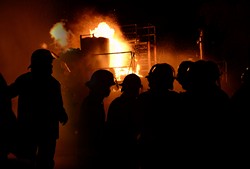How better PCP could save firefighters’ lives
Considered by the European Commission as an important tool to stimulate innovation in Europe, PCP is also seducing businesses. According to the Procurement Innovation Platform, one in 20 companies has been involved in the public procurement of innovative solutions since 2011. But what do we exactly know about the effectiveness of PCP? Which kind of approaches work, and which ones don’t? ‘If you decide to initiate a PCP, you first have to make sure what the demand of the market is,’ says Steven Cleeren of VLAIO, coordinator of the SMART@FIRE(opens in new window) project. ‘There is little use in procuring an innovative solution that doesn’t meet the needs of the end-users, and this is why a concrete case such as that of fire suits allows us to get down to the nitty-gritty of using PCP to support innovation’. Smart outfit from safer operations The need for increased safety of firefighters is recognised by many governments and organisations. Existing ‘smart’ technologies like sensors, GPS and data transfer and visualisation systems could be key enablers, but the market has so far not been able to fulfil this need: Despite recent advances in personal protective equipment, over 100 European firefighters still die in fires every year. This is partly because increasingly safe equipment has made firefighters both more confident and less prone to looking at the dangers surrounding them. According to Cleeren, overcoming this obstacle requires procurers such as fire brigades to get involved through PCP and encourage suppliers to begin a R&D process – which is exactly why the SMART@FIRE project was launched. ‘It is clear that only new ways of applying technology and innovation can provide a solution to the challenges of public and personal safety in an increasingly complex and hazardous world under increasing budget restrictions,’ he says. The SMART@FIRE team spent the first phase of the project assessing 961 fire brigades to identify needs for and potential for innovation. After that, they initiated a PCP to develop prototypes thanks to financial support from the EU. The resulting gear can gather sensory, biometric and localisation data and relay it to a commanding officer. ‘Two suppliers are in the final stages of developing, testing and delivering working prototypes of a ‘smart’ protective suit for firefighters,’ Cleeren says. ‘We can’t disclose too much information because at this stage of the process, much is still tied to non-disclosure agreements. However, the suits will be tested in a controlled environment in November in a specialised firefighter training facility in the south of France. We will then witness first-hand how the new gear performs in conditions as close as possible to reality.’ Once this is done, the team will be able to provide the market with a fully developed and tested off-the-shelf solution. Lessons learned for future PCP Besides the smart gear itself, the team also learned valuable lessons on how to successfully implement a PCP. ‘For example PCP entails that you share the risks and the benefits of developing an innovative solution, but you also share the development process itself. This means that procurers need to exercise a certain measure of flexibility. While private companies that invest in R&D and innovation are usually accustomed to adjusting their course of action, public organisations often have a harder time adjusting to reality,’ Cleeren says. The project team will present the project results and all PCP knowledge they gathered at the final conference that is due to take place in December 2016.



